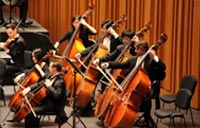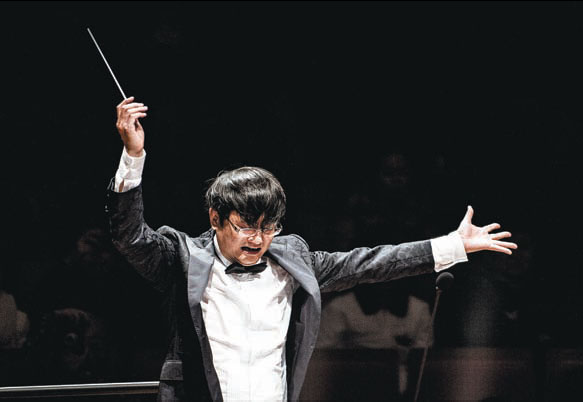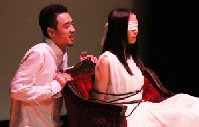Pop goes the symphony under master's direction
By Xu Jingxi in Guangzhou ( China Daily ) Updated: 2013-12-06 07:53:28|
Classical music gets a hip facelift as composer Li Haiying creates a contemporary blend for an appreciative crowd. Provided to China Daily |
| Rhinoceros makes a play for the US audience |
 |
| Top 10 Chinese music festivals |
The Crescent Moon is a song known to every Chinese, with the soft melody soothing their nostalgia. The Mandopop classic was given a new life on its 24th birthday at the composer Li Haiying's concert in Guangzhou's Xinghai Concert Hall recently, with an orchestra replacing the singer's crooning.
Li, a forerunner of Chinese pop music's surge in the 1980s and 1990s, is the composer behind Mandopop classics including The Crescent Moon and I Don't Want to Say.
He came to Beijing in 1999, rising to the challenge of composing for movies and TV dramas in the next decade. His scores for the popular series Drawing Sword and Happiness as Flowers are still famous.
At the age of 58,the composer decided to pursue his childhood dreams about symphony and adapted his pop classics as orchestral music last year.
"With songwriting software and the Internet, now everybody can write a pop song and find audiences. I need to explore new areas in music where I'm the first mover," Li says, branding his pop symphony creation Eagles Symphony after his name, which literally means sea eagle.
Li says too many people fear they can not understand classical music with out a musical education background.
"My symphonies won't have a stiff face. I hope that people coming to my concert will feel at ease, share my joy in writing the music and be touched."
To enrich the concert this year, Li invited violinist Wen Wei, soprano Li Siyin and harmonica performer Yang Le to stage beautiful harmonies with the orchestra.
As the concert's conductor, Li showed a more relaxed and approachable style this time. Wearing a leather jacket instead of suit and bowtie, Li faced the audience, shared stories behind his music and explained what he wanted to present in each chapter before he started one.
|
|
|
|
|
|
|
|























 Raymond Zhou:
Raymond Zhou: Pauline D Loh:
Pauline D Loh: Hot Pot
Hot Pot Eco China
Eco China China Dream
China Dream China Face
China Face





